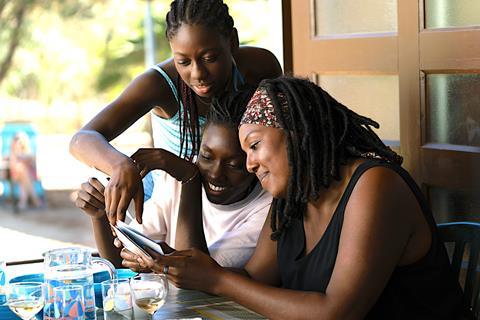A woman and her daughters face a difficult return home in Catherine Corsini’s Competition entry

Dir. Catherine Corsini. France. 2023. 107mins
French writer-director Catherine Corsini has been a Cannes regular since the start of the century, with political comedy-drama The Divide her last Competition entry in 2021. Follow-up Homecoming is a sober, spare drama about a woman and her daughters returning to Corsica after traumatic events years earlier, and what emerges most strongly in this adeptly woven story of race, desire and grief is Corsini’s experience in directing a cast which mixes non-professionals and familiar faces, with her young leads especially exuding energy, naturalness and sensitivity.
Not remotely out for provocation, the film handles its sexual moments, such as they are, with restraint and discretion
Ahead of the film’s Competition slot, Corsini has faced accusations of bad practice on set; notably regarding sexual scenes involving minors. The filmmaker denies these allegations, and there is certainly no trace of anything exploitative on screen. Indeed, this intelligent, accessible piece – the latest in Corsini’s catalogue of female-focused dramas - should engage emotions and find upscale niches aplenty.
Homecoming begins in Corsica, where a young Black woman, Khedidja (Aissatou Diallo Sagna), is preparing to leave for France with her two small daughters when she receives very bad news. Fifteen years later, we see Khedidja returning to the island to take up a summer childminding job with a moneyed couple (screen eminences Virginie Ledoyen and Denis Podalydès, giving good support value as hyper-privileged yet massively discontented metropolitans). She is accompanied by daughters Jessica (Suzy Bemba), now 18, and 15-year-old Farah (Esther Gohourou). Studious Jessica has received a prestigious offer to study at Paris’s Science-Politiques, while Farah is a rebellious hedonist and very disinclined to keep her head down – as we see when she tangles with racist beach boy Orso (Harold Orsini) and takes a hot-headed revenge on him, with unexpected long-term complications. As for Jessica, she bonds with Gaia (Lomane de Dietrich), the spoiled, headstrong daughter of her mum’s employers, then finds herself drawn irresistibly into a sexual relationship with her.
Khedidja, meanwhile, starts to confront her past, reconnecting with Marc-Andria (Cédric Appietto), the best friend of her late ex. But once Jessica learns more about the family’s history – and the things her mother has neglected to tell the girls, or lied about – emotional tensions boil over, and the sisters angrily fall out, with each other and with Khedidja.
Corsini and co-writer Naïla Guiguet handle the build-up of this simmering emotional stew with expertise, restraint and a nice degree of narrative intricacy. Taut, no-frills execution – notwithstanding some gorgeous but altogether untouristic landscape photography by Jeanne Lapoirie – helps to foreground the performances poignantly and compellingly.
Known for working with star names, Corsini gets outstanding performances from her leads, including a nicely low-register Diallo Sagna (the real-life medical worker who was the discovery of The Divide), emotionally enigmatic as the mother still mulling over the unresolved loose ends of trauma. The sisters are a dazzling find, and totally convincing as siblings with their tetchy but (sometimes) affectionate banter; newcomer Bemba as responsible but secretly angry Jessica, and Gohourou (previously in Maimouna Doucouré’s Cuties) charismatically energetic as the volatile rebel Farah. Also making a strong impression is up-and-coming Lomane de Dietrich as the characterfully abrasive, hyper-independent Gaia, and Appietto as the relaxed, simpatico Marc-Andria.
It doesn’t come as all that much of a surprise when the two sisters find themselves effectively swapping roles, in a climactic teenage party which might have come across as over-familiar, if Corsini hadn’t handled the narrative strands and general atmospherics to such focused effect. After this, however, the drama somewhat runs out of momentum, with an anticlimactic flashback accompanied by Khedidja’s explanatory voice-over; here the film awkwardly loses a grip on its storytelling, and similarly appears to lose confidence in odd moments where it offers us emotional nudges through lyrical piano music by Chopin and Tchaikovsky.
Otherwise, the dramatic and emotional control are manifest – as is the film’s seriousness of intent. Not remotely out for provocation, the film handles its sexual moments, such as they are, with restraint and discretion – with little to scare the horses, only a touch of decorous, semi-clad intimacy between Bemba and de Dietrich.
Production company: Chaz Productions
International sales: Playtime info@playtime.group
Producer: Elisabeth Perez
Screenplay: Catherine Corsini, Naïla Guiguet
Cinematography: Jeanne Lapoirie
Editing: Frédéric Baillehaiche
Production design: Louise Le Bouc Berger
Main cast: Aissatou Diallo Sagna, Suzy Bemba, Esther Gohourou, Lomane de Dietrich






![The Brightest SunScreen[Courtesy HKIFF]](https://d1nslcd7m2225b.cloudfront.net/Pictures/274x183/3/5/0/1448350_thebrightestsunscreencourtesyhkiff_312678.jpg)















![The Brightest SunScreen[Courtesy HKIFF]](https://d1nslcd7m2225b.cloudfront.net/Pictures/100x67/3/5/0/1448350_thebrightestsunscreencourtesyhkiff_312678.jpg)

